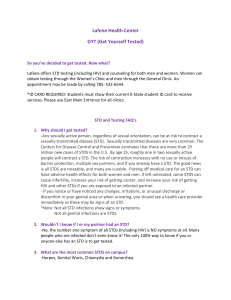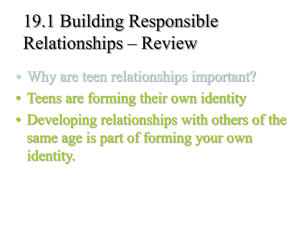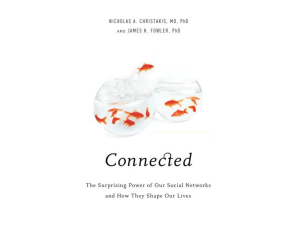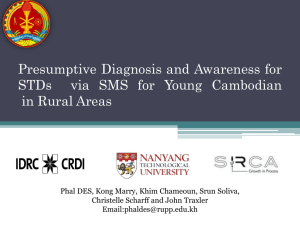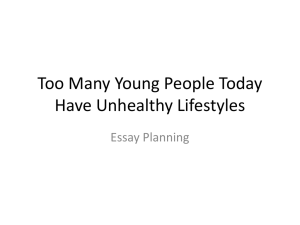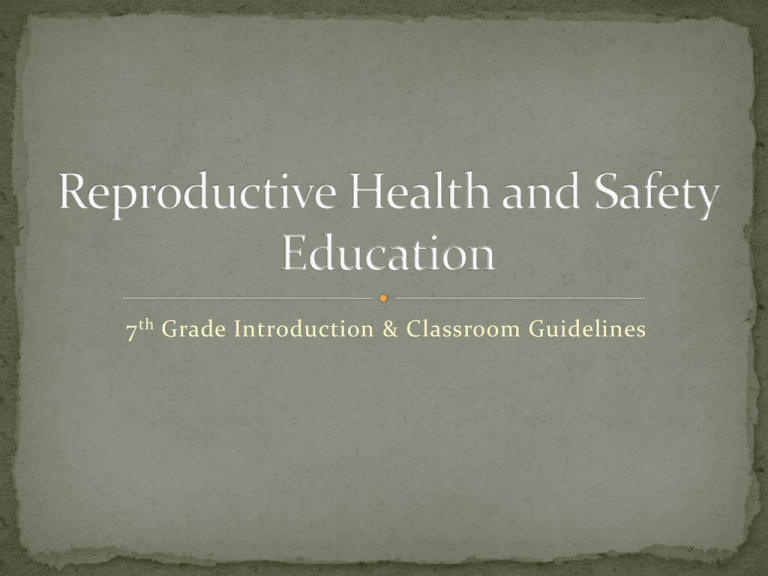
7 th Grade Introduction & Classroom Guidelines
A CRAZY TALE
Once upon a time there lived a very young and very beautiful woman. She lived with her
husband, a wealthy movie star, in a mansion near Hollywood. The young woman felt unhappy
and neglected because her husband frequently took long trips for movie shoots. One day, while
she was alone in the mansion, a handsome rock star drove by in his Bentley. He noticed the
young woman, quickly won her heart, and took her away with him.
After a day of partying like a rock star, the young woman found herself abandoned. She
discovered that the only path back to her mansion led through the evil town of Ellisonville and
Evil Ellison was the mayor. Not willing to brave the great danger alone, the woman visited the
home of her godfather. She explained what she had done, and begged forgiveness and help.
The godfather, however, was shocked. He refused all help.
The woman had almost given up hope when she spied Sproul The Great. He pledged his
unfailing help—for a small price. Unfortunately the woman had no money, so Sproul The Great
drove away in his minivan .
The woman had no one left to whom she could turn. She decided to brave the evil town of
Ellisonville and the Evil Ellison alone. She entered Ellisonville, whereupon the Evil Ellison caused
her to be devoured by an angry bear.
1.
2.
3.
4.
5.
6.
7.
The Woman
The Movie Star (husband)
Rock Star in the Bentley
The woman’s Godfather
Evil Ellison
Sproul The Great
The Bear
Respect what other people say; no put downs
Be sensitive to other people’s feelings
Respect other people’s differences
Keep discussion and questions away from a personal
level
Keep confidential all comments made by other
students
There are no “dumb” questions
Use CORRECT scientific terms rather than slang
END UNIT INTRODUCTION
Choosing the Best PATH
Lesson 1
Insights & Facts
Practical Ideas for remaining abstinent
Avoiding risks of teen pregnancy and sexually
transmitted diseases (STD’s)
Each lesson will have the following:
Brief video segment then discussion
Lesson exercises, application activities
Sharing assignment with parent/guardian
Time To Talk
1.
2.
3.
What reasons do some of these teens give for being
sexually active?
What are some of the risks of having sex?
Why do you think the majority of teens today are not
sexually active?
Time To Talk
1.
2.
3.
Did any of the risks that the teens mentioned surprise
you?
What are some of the possible negative emotional
consequences of having sex?
How does being sexually active as a teenager affect
how a person feels about himself or herself?
Repeated sexual encounters can make it difficult to
maintain lasting relationships because it becomes
harder to bond emotionally.
Activity: 1 male and 1 female volunteer.
Time To Experience: A Rose With No Petals
Time To Learn: Unscramble the following words that
identify possible negative emotional consequences of
sexual activity
litgu
yrowr
topnapsinmited
slso of fels – preects
sprisdeneo
Self-respect means treating yourself as a valuable
person.
How does being sexually active affect self-respect?
Maria babysits for a family that lives next door to a guy
named Roberto who goes to her school. Maria has had
a crush on Roberto for awhile, but he has ignored her
until recently. Every time she’s babysitting, he shows
up at the door and wants to come inside the house.
Sometimes when the baby is sleeping, he comes over
and watches videos with her. Gradually Roberto and
Maria become friendlier. She’s uncomfortable with
some of the things they do, but she doesn’t want to
lose him. After he leaves, she often doesn’t feel good
about herself.
How do activities that make Maria uncomfortable
lower her self-respect?
What other negative emotional consequences could
Maria experience?
If you were in Maria’s place, what would you do?
1.
2.
3.
4.
Why do you think some teenagers today start having sex?
What are the risks for sexually active teenagers?
What are some of the possible negative emotional
consequences of premarital sex?
What is the most important advice about sex that an
adult could give a teen who will listen?
END LESSON 1
List 3 possible negative emotional consequences of
teen sex.
2. List 3 possible risks of being sexually active.
3. Give 4 reasons why the majority of teens today are
not sexually active.
1.
Lesson 2
Time To Talk
Why did many of these teens think that the negative
consequences of sex wouldn’t happen to them?
How did getting an STD or HIV/AIDS change their lives?
1.
2.
3.
4.
5.
6.
7.
STDs are_________ transmitted diseases.
There are over________ significant STDs.
Some STDs can be contracted from_________ fluids of another
infected person. Other STDs can be contracted from _____ to ______
contact.
Bacterial STDs can be cured with antibiotics; viral STDs are
___________.
Many people with STDs do not have symptoms, so you often do
_________ know who is infected.
About one in _______ sexually active teens will contract an STD each
year.
The only way to totally eliminate the risk of contracting an STD is to:
be___________ until marriage, marry an _______ person and, both
people must remain___________ in the marriage relationship.
Further, both partners, must not participate in other high risk
activities (ex. IV drug use).
Chlamydia is a common _______ STD, infecting 3
million people in the U.S. each year. Including ____
million young people aged 15-24. Many people have
___ symptoms with chlamydia. If symptoms are
present they may include abnormal discharge or a
burning sensation when urinating.
While the disease can be cured with antibiotics, if left
untreated it can have serious consequences.
Chlamydia can lead to pelvic inflammatory disease
(PID) in women, which can lead to infertility.
Gonorrhea, another common bacterial STD, infects
_____ people in the U.S. each year.
Although many may have_____ symptoms at all,
symptoms in men and women may include a burning
sensation when urinating or abnormal discharges. In
women symptoms may be mild and mistaken for a
vaginal infection.
Gonorrhea can be cured with antibiotics, but remains
a major cause of________ leading to infertility.
HPV is a common_______ STD with 5.5 million new infections each year
and 20 million people currently infected in the U.S.
There are 30 types of HPV that can affect the _____area, including those
“high risk” strains that can lead to cervical cancer in women. Nearly
______ women die of cervical cancer each year. Other “low risk” types of
HPV cause genital _______, small growths on the genital area. HPV can be
spread by contact with the genital area of an infected partner.
There is ______ medical cure for HPV. Most mild infections can be
destroyed by the body’s immune system over time. If a “high risk” HPV
infection is not cleared by the immune system, it can remain present for
many years and turn abnormal cells into cancer over time.
A new vaccine against HPV is currently available for females and protects
against the strains of HPV that are the most common causes of cervical
cancer and genital warts. While the vaccine is expected to reduce rates of
cervical cancer, it does not provide complete protection. So sexually active
females are still at risk and should get regular Pap tests, which are
important for detecting cervical cancer early, when it can be treated most
effectively. Students should talk with their parents and doctors about this
vaccine.
Genital herpes is another common ______ STD. In the U.S.,
there are 1 million new infections each year with 45 million
people currently infected, involving nearly one in every
_______ people 12 years and older.
With or without symptoms, genital herpes can be
transmitted by_______ contact between sex partners.
Some people with genital herpes have symptoms, but most
don’t. Typical symptoms of genital herpes are painful,
recurring _______ or sores on or around the genitals or
rectum. People diagnosed with a first episode can expect
to have 4 to 5 outbreaks within a year. Medications can
help with outbreaks, but there is ____ cure for genital
herpes.
Trichomoniasis is a common STD caused by a
microscopic _______ infecting 5 million people in the
U.S. each year.
Most men have _____ symptoms. Some women may
have a vaginal discharge and experience discomfort
during intercourse or urination.
Trichomoniasis can be diagnosed through a physical
exam with a lab test, and can be _____ with a
prescription drug.
HIV, the virus that causes AIDS, progressively destroys
the body’s ability to fight ______ and certain cancers.
HIV is most often transmitted through sexual contact.
Of the approximately 56,000 new HIV cases per year,
an estimated _____ percent of those occurred among
young people under age 30.
It may take ____ before symptoms of AIDS appear.
However, an infected person can infect other sexual
partners whether or not symptoms are present.
1.
2.
3.
4.
5.
There is a cure for HIV/AIDS
An individual knows when he or she is infected with
HIV.
You cannot contract HIV from oral sex.
A person can contract HIV by shaking hands with an
infected person.
HIV/AIDS is only an adult disease and does not
occur in teenagers.
There are more than (10, 25, 100) significant sexually
transmitted diseases.
Every year approximately (2, 4, 8) million teens acquire
an STD.
That’s (1001, 2542, 10,959) every day, (101, 342, 457)
every hour, or one every (8, 20, 30) seconds.
FACT: When you have sex, you are exposed to your partner’s previous partners as well. The
possibility of getting an STD multiplies as each partner has sex with more people.
Your Partners
Their Partners
1
2
3
4
5
6
Total of your
Partner’s partners:
Total of your partners:
Total exposures:
_____
_____
_____
_____
_____
_____
_____
+
_____
= ______
1
6
2
YOU
5
3
4
Compassion is the attitude and action of caring about someone
who is in a distressing or difficult situation.
Time To Build Character
Write a letter to your parent or guardian describing how
you would feel if you had contracted HIV/AIDS.
Time To Share (interview parent/guardian)
1.
2.
3.
4.
What are some of the most common STDs?
Can STDs be cured?
How can you tell if someone has an STD?
What is the only way to eliminate the risk of
contracting an STD?
END LESSON 2
1.
2.
3.
4.
5.
6.
7.
8.
T/F STDs are sexually transmitted diseases.
T/F There are over 25 significant STDs.
T/F STDs can be contracted from body fluids of
another infected person.
T/F You will always know if you have an STD
T/F You can always tell if your partner has an STD.
T/F Many STDs have no symptoms.
T/F You can contract HIV and other STDs through
oral sex.
List 3 of the most common STDs.
Lesson 3
Watch: “Growing Up Too Quickly”
Time To Talk
Why did these couples think they wouldn’t get pregnant?
How did their lives change after they got pregnant?
Fill In The Blank
1.
2.
3.
4.
There are approximately _______ teen pregnancies each
year.
Nearly ______ of sexually experienced teen girls (those
who have had sexual intercourse at least once) have been
pregnant.
Teen mothers are less likely to finish high school: only
about _____ of teenagers who have a child before they are
18 have earned a high school diploma by age 30.
_________ is the only way to be absolutely sure that you
will not be involved in a teen pregnancy.
Remember pregnancy is always a “we” event – it takes two to
create a baby. What would happen if you (or your girlfriend)
became pregnant? What options would you have, and what are
the potential consequences of each option?
POSSIBLE OUTCOMES
1. Become a single ________.
2. Get __________.
3. Have an __________.
4. Place the baby up for __________.
CONSEQUENCES
__ a.m.: wake up
__ a.m.: take shower and get ready for school
__ a.m.: wake up and dress my son/daughter
__ a.m.: take my son/daughter to day-care
6:30 a.m.: go to school
1:30 p.m.: pick up my son/daughter at day-care
__ p.m.: give my son/daughter a bath
__ p.m.: feed him/her
__ p.m.: unpack his/her diaper bag and repack new one
__ p.m.: play with my son/daughter
__ p.m.: get ready for work
5:00 p.m.: go to work
9:15 p.m.: come home, feed my son/daughter, put him/her to bed
__ p.m.: make formula for the next day
__ p.m.: clean up the house (do laundry and homework)
__p.m.: go to bed
5:00 a.m.: wake up
5:15 a.m.: take shower and get ready for school
6:00 a.m.: wake up and dress my son/daughter
6:15 a.m.: take my son/daughter to day-care
6:30 a.m.: go to school
1:30 p.m.: pick up my son/daughter at day-care
2:00 p.m.: give my son/daughter a bath
2:30 p.m.: feed him/her
3:00 p.m.: unpack his/her diaper bag and repack new one
3:30 p.m.: play with my son/daughter
4:00 p.m.: get ready for work
5:00 p.m.: go to work
9:15 p.m.: come home, feed my son/daughter, put him/her to bed
9:30 p.m.: make formula for the next day
9:45 p.m.: clean up the house (do laundry and homework)
10:30 p.m.: go to bed
1.
CONDOMS DO FAIL.
Because latex condoms are made of rubber they can
_____ and ______. Studies show that this occurs ___ to
____ % of the time.
Typical couples who use condoms for birth control
experience a first year failure rate of _____ % in
preventing pregnancies.
CONDOMS DO NOT ELIMINATE THE RISK OF CONTRACTING STDs.
2.
For condoms to most effectively reduce the risk of contracting STDs they must be used
consistently, _________ time, and correctly. When used every time, condoms are:
According to the CDC, condom use cannot guarantee absolute protection against any
STD.
Most effective against HIV, reducing the risk by ____% versus not using a condom at all.
However, ___% of the risk remains for a life threatening disease with no cure.
Approximately ____% effective in reducing the risk of STDs spread by body _____, such as
chlamydia, gonorrhea, trichomoniasis. However, _____% of the risk remains.
Less effective in reducing the risk of STDs spread by _____ to ______ contact (ex. Herpes,
syphilis). Condoms offer ___ protection if the infection is located outside the area covered by
the condom.
Studies also show that condoms are less effective in protecting against _____, the most
common viral STD. However, some risk reduction may occur with HPV related symptoms (ex.
Genital warts and cervical cancer).
Is “safe or safer sex” safe enough?_________
________ provides the only 100% protection against contracting an STD.
We know that the annual failure rate of typical couples using condoms
to prevent a pregnancy is 15 percent. A 15 percent annual failure rate
means it fails approximately 1 out of every 7 times over the course of a
year.
Which of these activities would you do if you knew
there was a 15 percent annual failure rate?
A roller coaster ride at Carowinds?
An airline flight?
Skydiving?
Why do some teenagers risk getting pregnant,
contracting an STD, or being emotionally hurt by
being sexually active and using a condom?
METHOD
User Failure Rate
HIV/STD Prevention
No Contraception
85%
NONE
Spermicidal foam
29%
NONE
Rhythm (Calendar)
25%
NONE
Male Condom
15%
Most effective against
HIV; Less risk reduction
against other STDs.
Diaphragm
16%
NONE
Oral – “The Pill”
8%
NONE
Depo-Provera
3%
NONE
IUD
.9%
NONE
Abstinence
0%
100% PREVENTION
Definition: Responsibility is the attitude and action of realizing
and accepting the fact that you are accountable for your actions.
Make a list of ways your life would change if you were a
parent responsible for a baby.
Interview a parent/guardian by asking the following
questions:
1.
2.
3.
4.
How would you define “safe or safer sex”?
Does using a condom eliminate the risk of getting
pregnant?
Does using a condom eliminate the risk of contracting
and sexually transmitted disease?
What is the only way to totally eliminate the risk of
pregnancy or contracting an STD?
END LESSON 3
1.
2.
3.
4.
5.
6.
7.
8.
T/F There are more than 800,000 teenage pregnancies each
year.
T/F Most teen moms will graduate from high school.
T/F Typical couples who use condoms for birth control
experience a first year failure rate of 15% in preventing
pregnancies.
T/F Condoms can break and slip off.
T/F Condoms do eliminate the risk of contracting STDs.
T/F Some STDs are transmitted through skin-to-skin contact.
T/F Abstinence is the only 100% way to absolutely certain you
will not be involved in a teen pregnancy.
List 3 ways teen couples’ lives can change with a teen
pregnancy.
Lesson 4
Watch “Where’s the Pressure Coming From?”
Time to Talk
What does it mean to be “pressured”?
What pressures to be sexually active did the teens
experience?
What does the media say about sex?
What is peer pressure?
Pressure to do something because a peer (friend) wants
you to do it.
What causes someone to do something just because
others want them to do it?
Ex.) fear of rejection, need for acceptance
What are you willing to do to be accepted?
Hormones cause sexual development and growth, as well as
intense sexual feelings.
It is normal to have sexual feelings as your body changes.
However, acting on what feels good without thinking of the
consequences is an immature way to handle these sexual
pressures.
An immature attitude says: I want it. I need it. I’ll do it my
way.
A mature attitude says: I’ll think before I act. I’ll consider
the consequences. I won’t act on my feelings.
ACTION
You get angry
You want to be accepted
by others
You’re too tired to
practice with the team
You don’t want to study
for a test
Someone you like wants
to have sex with you
RESPONSE
CONSEQUENCES
How is curiosity a sexual pressure?
Time To Experience Activity (A Mint for Marriage)
How does a peppermint pattie smell?
How does the smell make you anticipate the taste?
1.
2.
3.
4.
5.
6.
7.
8.
Teens 15 and older who drink alcohol are (not as, a little, seven
times) likelier to have sex than those who don’t drink.
Alcohol (lowers, keeps the same, increases) inhibitions, resulting
in poor judgment.
Alcohol is a (toxic drug, stimulant, depressant).
A (shot of liquor, can of beer, glass of wine) contains the most
alcohol.
Alcohol can impair (mental, social, sexual) development in young
people.
Binge drinking (more than 4-5 drinks in one sitting) can numb brain
cells causing (a headache, a stomachache, death).
Alcohol use is present in nearly (one-tenth, one-third, half to
three-fourths) of all date rapes among college students.
Alcoholism is a chronic disease with (no cure, some cure, a complete
cure). Currently, nearly 14 million Americans – 1 in every (3, 5, 13)
adults – abuse alcohol or are alcoholics.
Definition: Respect is the attitude and action of valuing others
and treating each person with dignity.
Which of the following situations demonstrates
respect
You tease another person
You put down your boyfriend/girlfriend after you break up
You listen when a friend is hurting
You don’t join in when others start gossiping
You tell rude jokes about the opposite sex
How can you show respect to another person?
END LESSON 4
1.
2.
3.
4.
5.
List 4 ways teens might feel pressured to have sex.
What message does the media give about sex?
Give a characteristic of immature behavior.
Give a characteristic of mature behavior.
List 3 ways alcohol can adversely affect a young
person.
Lesson 5
Watch “Choosing Abstinence Until Marriage”
Time To Talk
Why do you think more than half of teenagers choose to be
abstinent?
Why do you think the teens say that abstinence until
marriage is the best path for a teenager to take?
What freedoms do you have if you choose to wait until
marriage?
Time To Experience
½ of class: Reasons why some teens choose to have sex.
½ of class: Reasons why some teens choose to not have sex.
Which list has the healthiest ideas to help you choose the
best path?
Abstinence is easy as A-B-C
Abstinence is the:
Best preparation for the future by:
Choosing not to engage in these at-risk sexual behaviors:
Sexual intercourse
Oral sex
Anal sex
Mutual masturbation
Waiting to have sex gives you freedom to pursue goals and
dreams.
List 3 goals and how abstinence will help you reach each
goal.
13 volunteers
8 girls
5 guys
Each volunteer will receive a sign with a name on it to
hold.
Paper represents Michael & Makayla’s wedding bed.
I will read a story, when you hear the name on your
sign called come and sit on the paper.
END LESSON 5
1.
2.
3.
4.
List 3 reasons why some teens choose to be sexually
active.
List 5 reasons why the majority of teens choose to be
abstinent.
Abstinence is the best preparation for the ________
by________ not to engage in at-risk sexual behavior.
Which of the following is considered an at-risk sexual
behavior
a)
b)
c)
d)
e)
Vaginal sex
Oral sex
Anal sex
Mutual masturbation
All of these
Lesson 6
Watch Video
Time To Talk
Is there a difference between love and sex?
Can you love someone without having sex?
How does choosing not to have sex affect a relationship?
Class divided into boys and girls
Each group appoints a leader
You will have 7 minutes to work on answering the
questions on the next slide.
The opposite group will award points from 1-5 for each
response you think reflects a healthy understanding of
the opposite sex. The group with the highest score
wins.
1.
2.
3.
4.
5.
What do you wish guys/girls knew about guys/girls?
What qualities do you look for in a guy/girl?
What qualities do you think guys/girls want in a
guy/girl?
What activities would make a great date?
What activities do you think guys/girls would like on
a great date?
LOVE
is a commitment to the happiness of someone you care
about. It is tested by time and circumstances.
INFATUATION
is an intense feeling or being attracted to another
person, which is untested by time and circumstances.
What is one way you can tell if you are in love or if you
are infatuated with the other person?
(let time go by, spend time together doing what the
other person likes to do)
Which group will place the words/phrases in the
correct group (Love or Infatuation)?
You will label your paper with 2 columns
LOVE
INFATUATION
When the next slide appears write the correct
words/phrases in the correct column (Love or
Infatuation)
Untested by time
Long-term
Possessive
A decision
A physical attraction
Self giving
Increases over time
Temporary
Strengthens the
relationship
jealous
Based on feelings
Cares for another
Fears losing the person
Happens frequently
Excludes others in
relationships
A friendship that grows
Trusting
Expects immediate
gratification
Patient with the other
person
On their first date Alan and Susie were both shy. As the
night went on, they felt more comfortable and held hands.
At the end of the date, Alan gave Susie a short kiss. On
their next date, one kiss was not enough and they kissed for
several minutes. Eventually, that was no longer satisfying
and they started fooling around more seriously. Before they
knew what was happening there was only one line left to
cross, and they had sex. Soon their relationship grew bitter.
They broke up, each feeling used and empty.
1.
2.
How did sex affect their relationship?
Why did Alan and Susie feel the need to go further each
time?
You will always want more than you had before. That’s
why it’s important to set your boundaries before you
get in situations that may take you further than you
want to go.
Now let’s learn about the “Grandma Rule” and how
that cute little lady can help you set boundaries...
Holding Hands
Hugging
Kissing
French Kissing
Touching
“Other Stuff”
Intercourse
Self-discipline comes from a personal decision to do (or not
do) something in order to reach a goal.
How does self-discipline help an athlete? A good
student? A musician?
How will self-discipline help you wait to have sex until
marriage?
LIST BOUNDARIES YOU WOULD LIKE TO
ESTABLISH:
1.
2.
3.
I choose not to be at the following locations:
I choose not to be in the following situations:
I choose not to go beyond the following sexual step before
marriage:
END LESSON 6
List 3 characteristics of infatuation.
2. List 3 characteristics of love.
3. List 3 steps to becoming “pressure proof”.
4. What does it mean to “set boundaries”?
1.
Lesson 7
Watch Video
Time To Talk
What words or lines have you heard people use to
influence someone to have sex?
What would you say if you were on the receiving end of
one of these lines?
Why is it hard to say “no” to someone you care about?
1.
When friends try to pressure you with putdowns give
a comeback.
1st guy: You mean you’re still a virgin?
2nd guy: I’ve decided to wait so I never have to worry
about getting a disease.
1st guy: Everybody’s doing it; what’s wrong with you?
2nd guy: Everybody’s not doing it. I’m waiting to do it
the right way, with the right person at the right time so
I never have any regrets.
2.
When you here a line from someone use a linebacker.
Line: Come on. Everybody’s doing It!
Linebacker: I want to marry someone who is
inexperienced so we can learn together.
Line: This is between the two of us; no one will ever
know.
Linebacker: If you love me, you’ll respect my feelings
and stop pushing me.
Your boyfriend/girlfriend makes a suggestion: “No one’s at
my house all day. Why don’t you come over?”
First you make a POSITIVE statement- Yes
“I really like spending time with you.”
Follow this with a NEGATIVE statement, but don’t put the
other person down- No.
“But I’m not sure I trust myself being alone with you.”
Finally, add a POSITIVE statement that offers an alternative –
Yes.
“Let’s go to the mall and hang out with the others.”
Application
Use YES-NO-YES to avoid the following suggestion: “Let’s
take a little detour on our way home.”
When someone puts you on the defense, grab the
offense instead. Sometimes you need to let the person
who is pressuring you know how you feel. Take the
offense by using these phrases:
When you do…, I feel…
When you say…, I feel…
Here’s an example.
“Look, I really love you, but when you keep pressuring
me after I say ‘no’, I feel you don’t really care about me.”
“When you keep pushing me to have sex after I say ‘no’, I
feel used and angry. Why don’t you show me you care
about me by respecting me?”
Definition: Courage means facing difficulties and pressures while remaining firm
in your beliefs. It takes courage to stand up for abstinence when others seek
instant gratification.
Speaking up may cost you a few friends. It may even create some problems
in your relationship with your girlfriend or boyfriend. How would courage
help in the following situations?
You log into your favorite chat room and read the following posts. How
would you respond to them?
1. Help! I’m afraid if I tell my boyfriend “no” one more time he’ll break
up with me. This is the first guy I’ve dated seriously and I don’t want
to lose him. How can I say “no” to sex without losing him?
2. My girlfriend keep saying “no” to everything I want to try. At least she
says “no” with her words, but everything else – her flirting, her
clothes, her kisses – say, “keep going!” Man, am I confused.
3. I made a pledge to be abstinent when I was younger and not dating.
Now, I’m dating, and it’s getting harder and harder to keep that
pledge. What do I do?
END LESSON 7
1.
Reply to these “putdowns” with a “comeback”.
a)
b)
2.
List linebackers for the following “lines”:
a)
b)
c)
d)
3.
4.
5.
You mean you’re still a virgin?
I can’t believe you haven’t done it yet.
Come on. Everybody is doing it.
If you really love me, then prove it.
You owe me something for all I’ve done for you.
We can stop anytime, I promise.
Why is it hard to say no to someone you care about?
How do you say no to someone you care about?
Respond to the following with a yes-no-yes: “No one’s at
my house all day. Why don’t you come home with me?”
Lesson 8
Watch Video
Time To Talk
How did these teenagers feel pressured?
How well did they stand up under pressure?
How were they assertive?
It’s your right to say “NO” when someone asks you to do something you
choose not to do.
5 ways to be assertive with your:
Head
Place where you make decisions about your standards, boundaries, and goals.
How can having standards, boundaries and goals help you be assertive?
Heart
Show you care for, respect, and value yourself and others.
Is there a difference between assertive behavior and aggressive behavior?
Mouth
The way you say “NO” in a firm, strong voice. Giving reasons and offering
alternatives provide different ways of responding to sexual pressure.
Body Language
How you hold your body, the way you dress, even the way you stand sends out
strong messages.
Feet
Sometimes the best assertive move you can make is to walk away from the
pressure.
Situation #1 “The Guys”
Background
Darin is on the basketball team. His friends are constantly talking about girls and
sex. Darin has been dating Angel for the past six months and spends a lot of time
with her. They have chosen to be abstinent.
Scene
Darin and two of his friends are talking after school about an upcoming party.
They ask Darin if he is going, and he says he will have to check with Angel. His
friends want to know if he’s having sex with Angel since he’s spending so much
time with her. When Darin explains that he’s not having sex with her, they start
to put pressure on him.
Planning
How should Darin be assertive?
Evaluation (on a 1-5 scale, where 1 is not so good, and 5 is
excellent)
How realistic was Darin?
How realistic were his friends?
How could Darin have been better at being assertive?
Girl reads Background and Scene
Planning
How should Paula be assertive?
Evaluation
How realistic was Paula?
How realistic were her friends?
How could Paula have been better at being assertive?
Volunteer to read Background and Scene
Planning
How should Steve be assertive?
Evaluation
How realistic was Sarah?
How realistic was Steve?
How could Steve have been better at being assertive?
Volunteer to read background and scene
Planning
How should Farah be assertive?
Evaluation
How realistic was Sonny?
How realistic was Farah?
How could Farah have been better at being assertive?
Choosing the best path takes perseverance to stay sexually abstinent
until marriage. Perseverance means you stick to it, and it involves:
Commitment: making a decision and sticking with it.
Courage: taking a stand every time you say “NO”, even when those
around you say “yes”. Write down the name of someone to talk with
about the pressures you face. List the things you want to talk about.
Answer the following questions on a separate sheet of
paper.
1.
2.
3.
What have you learned from this unit on Choosing The Best
Path?
How has it changed the way you think about yourself?
What promises have you made to yourself as a result of this unit?



